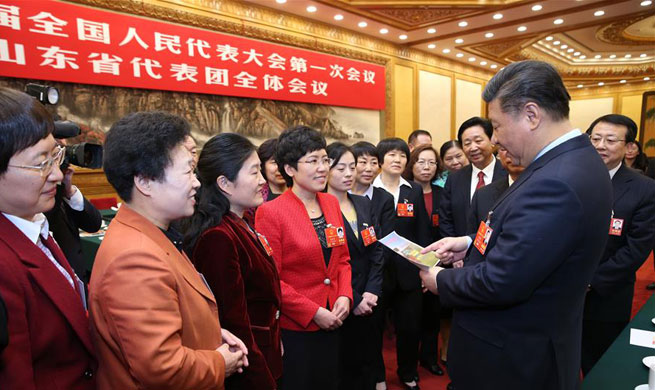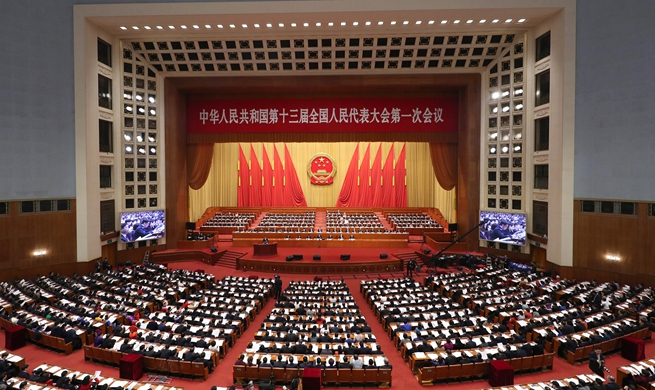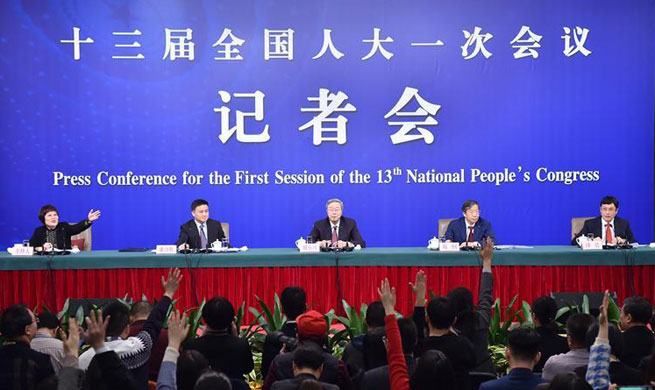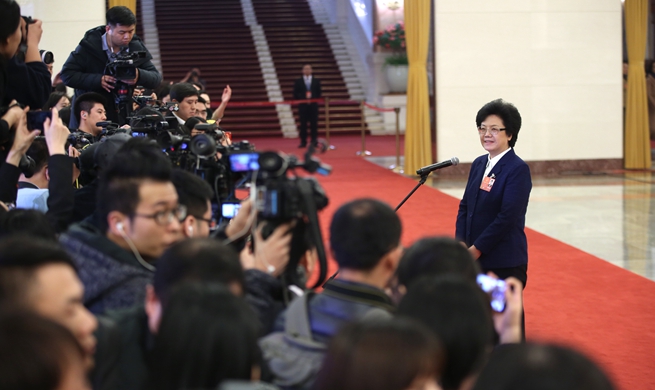BEIJING, March 9 (Xinhua) -- U.S. President Donald Trump has agreed to a face-to-face meeting with Kim Jong Un, top leader of the Democratic People's Republic of Korea (DPRK) "at a place and time yet to be determined," said the White House in a statement Thursday.
Trump could be the first sitting U.S. president to meet the DPRK's top leader, which observers say would be a big step toward resolving the Korean Peninsula nuclear issue.
However, analysts say that the final settlement of the nuclear issue has a long way to go, as risks and uncertainties still linger on the Korean Peninsula.
POSITIVE DEVELOPMENT NOT BEYOND EXPECTATION
The White House's announcement came in response to an invitation relayed by South Korea's top national security adviser, Chung Eui-yong, who briefed Trump and other U.S. officials on Chung's recent meeting with Kim in Pyongyang.
Chung said in a statement that he told Trump about Kim's eagerness to meet the U.S. president as soon as possible, and Trump told Chung that he would meet the DPRK leader before May.
Kim also agreed to refrain from conducting further nuclear or missile tests during this period, Chung added.
White House Press Secretary Sarah Sanders, while confirming Trump's acceptance of Kim's invitation, emphasized that "all sanctions and maximum pressure must remain" in the meantime.
Signs of a thaw on the Korean Peninsula emerged earlier this year since working-level talks between the two Koreas were held at the truce village of Panmunjom and the DPRK participated in the PyeongChang Winter Olympics. In addition, the two Koreas agreed to hold the third inter-Korean summit in late April.
Observers say the recent positive momentum on the Korean Peninsula is not beyond expectation.
During the Olympics, the DPRK suspended missile tests, while at the same time, the United States and South Korea postponed their joint military drill till April. China's suspension-for-suspension proposal has proven to be a right prescription for the problem in creating the basic conditions needed for improving inter-Korea relations.
The DPRK has reason to believe that it's the right time to actively resolve the issue as the South Korean government has recently mediated between the DPRK and the United States, and the U.S. side will face mid-term elections soon, said Kim Yong Hyun, professor of North Korean studies at Dongguk University.
Analysts say the DPRK's passing of an "olive branch" to the United States reveals its intention to relieve its isolation in the international community and to ease domestic economic difficulties caused by sanctions.
Although the United States has not given up military measures to solve the issue, peaceful means of dialogue remain the top option, said Gao Haorong, a researcher at the Center for World Studies of Xinhua News Agency.
"On the one hand, the U.S. sanctions and pressure policies cannot play an effective role till now so they need to find another solution. One the other hand, the DPRK has basically met the U.S. requirements for dialogue, that is, to express the willingness of denuclearization," Gao said.
UNCERTAINTIES REMAIN
Uncertainties remain whether the leaders of the DPRK and the United States can finally meet each other in May. Analysts say that the two sides need to initiate working-level consultations at first. If their positions are too divergent to see eye to eye, the face-to-face meeting may not be held as scheduled.
"If real negotiations result in verifiable arrangements aimed at the elimination of nuclear weapons programs in the DPRK and an end to the further development of long-range ballistic missiles, the principle source of tensions and hostility between the DPRK and the United States and the rest of the world will also be eliminated," said Robert Callucci, chief U.S. negotiator with the DPRK during the nuclear crisis of 1994.
Zheng Jiyong, director of the Center for Korean Studies at China's Fudan University, said that even though the planned DPRK-U.S. direct dialogue can ease the tension on the Korean Peninsula, it is only the first step toward the final solution of the nuclear issue. The core issue of nuclear abandonment remains a daunting task.
Despite the uncertainties, the United States should seize its diplomatic initiative to engage in dialogue with the DPRK in a clear and direct manner to reduce the possibility of misjudgment, said the Brookings Institution's Ryan Hass, a former security advisor under the Obama administration.


















